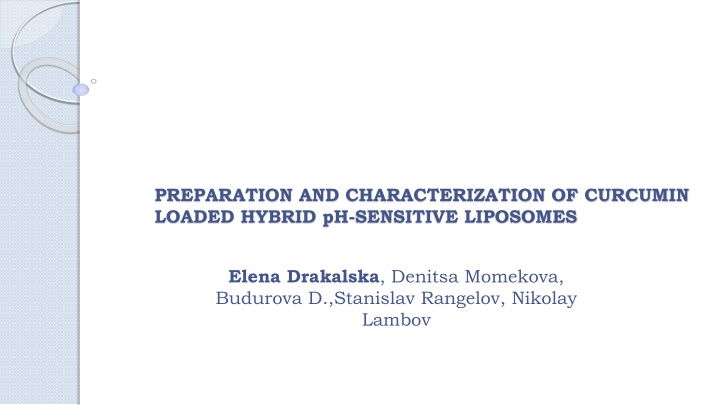
Curcumin-Loaded Hybrid pH-Sensitive Liposomes for Antineoplastic Activity
Discover the preparation and characterization of curcumin-loaded hybrid pH-sensitive liposomes for pleiotropic antineoplastic activity without toxicity to normal cells. Overcome disadvantages such as poor aqueous solubility and low bioavailability with promising results, including monomodal distribution and in vitro drug release profiles. Explore the cytotoxicity and conclude the potential of hybrid pH-sensitive liposomal nanoparticles for curcumin delivery.
Download Presentation

Please find below an Image/Link to download the presentation.
The content on the website is provided AS IS for your information and personal use only. It may not be sold, licensed, or shared on other websites without obtaining consent from the author. If you encounter any issues during the download, it is possible that the publisher has removed the file from their server.
You are allowed to download the files provided on this website for personal or commercial use, subject to the condition that they are used lawfully. All files are the property of their respective owners.
The content on the website is provided AS IS for your information and personal use only. It may not be sold, licensed, or shared on other websites without obtaining consent from the author.
E N D
Presentation Transcript
PREPARATION AND CHARACTERIZATION OF CURCUMIN LOADED HYBRID pH-SENSITIVE LIPOSOMES Elena Drakalska, Denitsa Momekova, Budurova D.,Stanislav Rangelov, Nikolay Lambov
Introduction - Pleiotropic antineoplastic activity - Without toxicity to normal cells
Disadvantages -Poor aqueous solubility (11ng/ml) -Instability in physiological pH -Low bioavailability
Results - Monomodal distribution - Size app.180 nm - Zeta potential -20mV
In vitro drug release profile Figure 2. In vitro curcumin release from hybrid non pH sensitive (black) and hybrid pH-sensitive liposomes
Cytotoxicity - MTT- dye reduction assay - Panel of human cancer cell lines
Conclusion These findings give us a reason to conclude that the hybrid pH- sensitive liposomal nanoparticles are promising platforms for curcumin.
